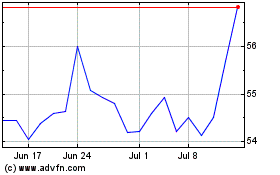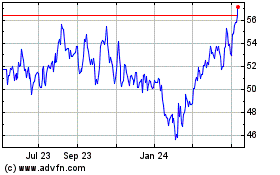National Fuel Gas Company Announces Sale of Its Landfill Gas Business
September 03 2010 - 4:04PM
Business Wire
National Fuel Gas Company (“National Fuel” or the “Company”)
(NYSE: NFG) announces the closing of the sale of its landfill gas
business to Toro Energy GP II, LLC, Toro Energy Holdings II, LP and
another undisclosed buyer.
The sale is expected to result in a non-recurring gain in the
Company’s fourth quarter, which closes on September 30, 2010.
Because of this transaction, the Company is today updating its GAAP
earnings guidance for fiscal 2010 to a range of $2.65 to $2.75 per
share (from the most recent guidance of $2.60 to $2.70 per
share).
“With the sale of our landfill gas business, we continue to make
progress on the strategy of divesting our smaller, non-core assets.
This transaction, coupled with the previously announced agreement
to sell our sawmill operations, demonstrates our commitment to
National Fuel’s core businesses, including the development of the
Marcellus Shale and the construction of key pipeline infrastructure
projects throughout the Appalachian region,” said David F. Smith,
Chairman and Chief Executive Officer.
The Company’s landfill gas operation was maintained under
National Fuel’s wholly owned subsidiary Horizon LFG, Inc., which
owned and operated seven short-distance landfill gas pipeline
companies that purchase, process, transport and resell landfill gas
to customers in six states. Ewing Bemiss & Co. was the
Company’s exclusive adviser on the transaction.
National Fuel is an integrated energy company with $4.9 billion
in assets distributed among the following four operating segments:
Exploration and Production, Pipeline and Storage, Utility and
Energy Marketing. Additional information about National Fuel is
available on its website at investor.nationalfuelgas.com or through
its investor information service at 1-800-334-2188.
Certain statements contained herein, including those that are
identified by the use of the words “anticipates,” “estimates,”
“expects,” “forecasts,” “intends,” “plans,” “predicts,” “projects,”
“believes,” “seeks,” “will,” “may” and similar expressions, are
“forward-looking statements” as defined by the Private Securities
Litigation Reform Act of 1995. Forward-looking statements involve
risks and uncertainties, which could cause actual results or
outcomes to differ materially from those expressed in the
forward-looking statements. The Company’s expectations, beliefs and
projections contained herein are expressed in good faith and are
believed to have a reasonable basis, but there can be no assurance
that such expectations, beliefs or projections will result or be
achieved or accomplished. In addition to other factors, the
following are important factors that could cause actual results to
differ materially from those discussed in the forward-looking
statements: financial and economic conditions, including the
availability of credit, and their effect on the Company’s ability
to obtain financing on acceptable terms for working capital,
capital expenditures and other investments; occurrences affecting
the Company’s ability to obtain financing under credit lines or
other credit facilities or through the issuance of commercial
paper, other short-term notes or debt or equity securities,
including any downgrades in the Company’s credit ratings and
changes in interest rates and other capital market conditions;
changes in economic conditions, including global, national or
regional recessions, and their effect on the demand for, and
customers’ ability to pay for, the Company’s products and services;
the creditworthiness or performance of the Company’s key suppliers,
customers and counterparties; economic disruptions or uninsured
losses resulting from terrorist activities, acts of war, major
accidents, fires, hurricanes, other severe weather, pest
infestation or other natural disasters; changes in demographic
patterns and weather conditions; changes in the availability and/or
price of natural gas or oil and the effect of such changes on the
accounting treatment of derivative financial instruments or the
valuation of the Company’s natural gas and oil reserves;
impairments under the SEC’s full cost ceiling test for natural gas
and oil reserves; uncertainty of oil and gas reserve estimates;
factors affecting the Company’s ability to successfully identify,
drill for and produce economically viable natural gas and oil
reserves, including among others geology, lease availability,
weather conditions, shortages, delays or unavailability of
equipment and services required in drilling operations,
insufficient gathering, processing and transportation capacity, and
the need to obtain governmental approvals and permits and comply
with environmental laws and regulations; significant differences
between the Company’s projected and actual production levels for
natural gas or oil; changes in the availability and/or price of
derivative financial instruments; changes in the price
differentials between oil having different quality and/or different
geographic locations, or changes in the price differentials between
natural gas having different heating values and/or different
geographic locations; changes in laws and regulations to which the
Company is subject, including those involving derivatives, taxes,
safety, employment, climate change, other environmental matters,
and exploration and production activities such as hydraulic
fracturing; the nature and projected profitability of pending and
potential projects and other investments, and the ability to obtain
necessary governmental approvals and permits; significant
differences between the Company’s projected and actual capital
expenditures and operating expenses, and unanticipated project
delays or changes in project costs or plans; inability to obtain
new customers or retain existing ones; significant changes in
competitive factors affecting the Company; governmental/regulatory
actions, initiatives and proceedings, including those involving
derivatives, acquisitions, financings, rate cases (which address,
among other things, allowed rates of return, rate design and
retained natural gas), affiliate relationships, industry structure,
franchise renewal, and environmental/safety requirements;
unanticipated impacts of restructuring initiatives in the natural
gas and electric industries; ability to successfully identify and
finance acquisitions or other investments and ability to operate
and integrate existing and any subsequently acquired business or
properties; changes in actuarial assumptions, the interest rate
environment and the return on plan/trust assets related to the
Company’s pension and other post-retirement benefits, which can
affect future funding obligations and costs and plan liabilities;
significant changes in tax rates or policies or in rates of
inflation or interest; significant changes in the Company’s
relationship with its employees or contractors and the potential
adverse effects if labor disputes, grievances or shortages were to
occur; changes in accounting principles or the application of such
principles to the Company; the cost and effects of legal and
administrative claims against the Company or activist shareholder
campaigns to effect changes at the Company; increasing health care
costs and the resulting effect on health insurance premiums and on
the obligation to provide other post-retirement benefits; or
increasing costs of insurance, changes in coverage and the ability
to obtain insurance. The Company disclaims any obligation to update
any forward-looking statements to reflect events or circumstances
after the date hereof.
National Fuel Gas (NYSE:NFG)
Historical Stock Chart
From May 2024 to Jun 2024

National Fuel Gas (NYSE:NFG)
Historical Stock Chart
From Jun 2023 to Jun 2024
